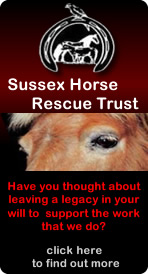
Horseytalk.net Special Interview
Andreas Liefooghe
Horses aid anti-bullying campaign
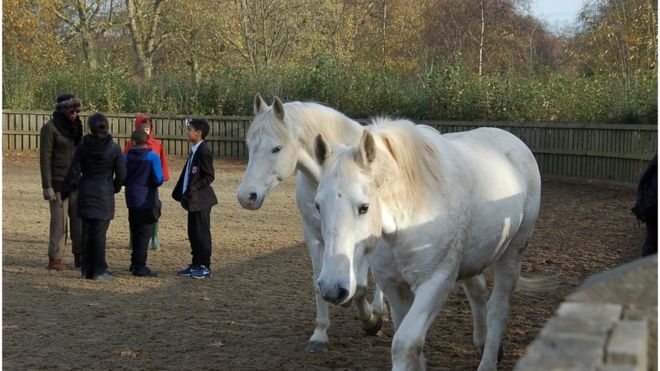
At first, the horses kept their distance from the group
There are many initiatives aimed at tackling bullying. One of the most unusual involves working with horses.
On a raw November morning in London's Hyde Park, seven children and three of their teachers from a nearby comprehensive school have been set the daunting task of befriending two grey horses trotting smartly around the edge of an exercise ring.
The children enter individually and quickly find chasing the horses just makes them run faster.
Standing still, however, encourages them to slow down. And one boy manages to touch one of the horses on the belly before jumping away, nervous himself.
The teachers are more successful - they are calmer, and the horses come to them.
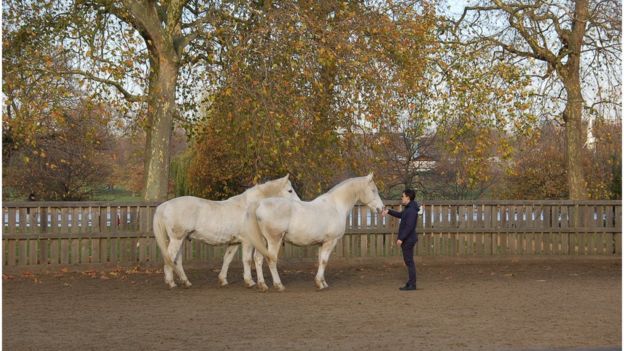
Being still and calm gave the horses more confidence
Each child is given a few minutes to attempt the task before being called over for feedback from Andreas Liefooghe, a child psychologist and psychotherapist who runs the project, Operation Centaur, which uses horses in work with groups of children and adults who are dealing with various forms of stress, and equine behaviourist Andy Moody.
Once all the pupils and teachers have entered the ring, they are set another challenge: to form a mixed-species herd.
This is even more difficult. The horses are suspicious, trotting off at any attempt to approach them.
"For horses, their priority is always their own safety," Andreas says later.
"If the horses run away, it's because they don't feel safe. If the kids are quiet and confident, the horses are calmer."
The aim of the exercise is to show the children how their behaviour affects others in their group, he says.
"These grey horses are very good at giving feedback."
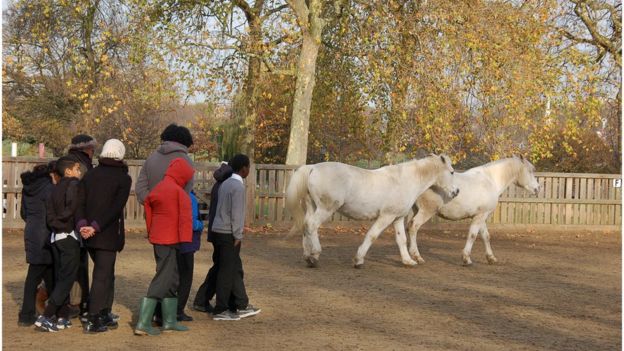
The school group formed a "herd" and moved slowly round the arena
The idea that working with animals can have a therapeutic benefit for some groups has been around for several decades, according to Andreas.
In particular contact with animals can help release emotion in people who find it difficult to express themselves through language, teenagers, the bereaved or people suffering depression, he explained.
"People project onto the horses really powerful feelings."
This work with children was piloted last year and, in a joint partnership with theRoyal Parks Foundation, will this year reach more than 100 children with special educational needs or behaviour management issues in inner London schools.
It has particular traction where bullying is an issue, he explained.
"By simply kicking out a bully from a group, you are creating a job vacancy.
"This project is about creating self-managing groups."
Attempting to form a relationship with the horses makes the children focus on their non-verbal behaviour.
They and their teachers form themselves into a calm, slow moving "herd".
Gradually, the horses slow and circle closer, heads down, snorting: submissive behaviour.
"They are trying to find a way into the group, but there's energy they are not too sure of yet," says their handler, Tom Nixon, watching from outside the ring.
"Even though you might be calm on the outside, they can pick up your emotion.
"They are making an effort there, asking to be invited in."
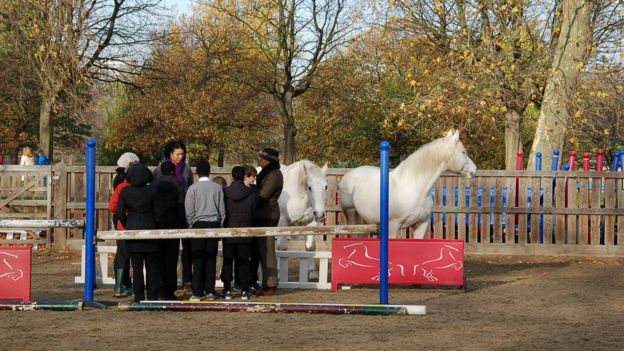
The animals moved closer, asking to be allowed into the group
But one of the boys suddenly jumps out of the group and runs sideways, disrupting the "herd".
"We make a plan, and he just runs over there," complains another.
This is the fourth session these children have attended. Previously, they worked with bigger and calmer shire horses.
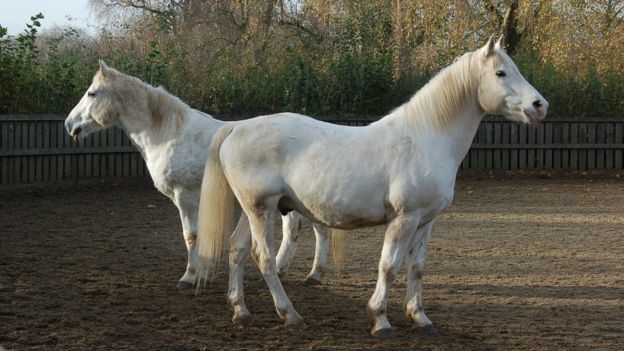
Henri, 16, and Homer, 17, are a pair of French draft horses with some Arab blood,
so they are sharper and more lively than the shires the children worked with previously
This is the first time they have met this pair of French carriage-driving horses, Henri 16, and Homer, 17, lighter in build, more sensitive to their surroundings and to human emotions, and far more lively than the shires.
"This group would not have been able to work with these horses last week. This is a big achievement in three sessions," says Andreas.
"The aim is they find ways to adapt their behaviour in constructive ways.
"They are finding that co-operation is far easier than being in conflict all the time.
"You can tell them this stuff in a classroom over and over again and it means nothing.
"They actually experience it there so visibly, it has a profound effect."
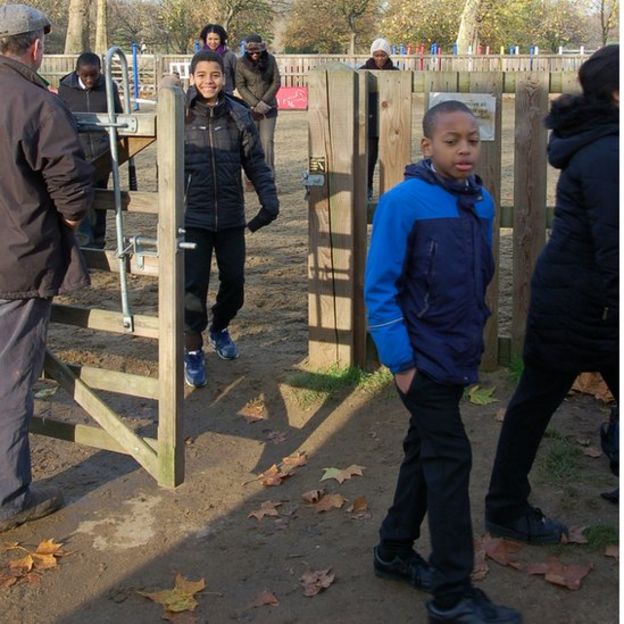
I wouldn't want someone to come up to me going, 'Oi, you, Aaron!' and stroke me on the nose."
And the message does seem to be getting through.
Aaron, 12, says he was "kind of scared" when he first went in.
One of the horses "tried to kick one of the teachers because the student went up to it making a noise and it didn't feel comfortable", he says.
"But Andy and Andreas said once we were calm the horses would feel calmer, a lot more safe, and come up to you.
"I wouldn't want someone to come up to me going, 'Oi, you, Aaron!' and stroke me on the nose."
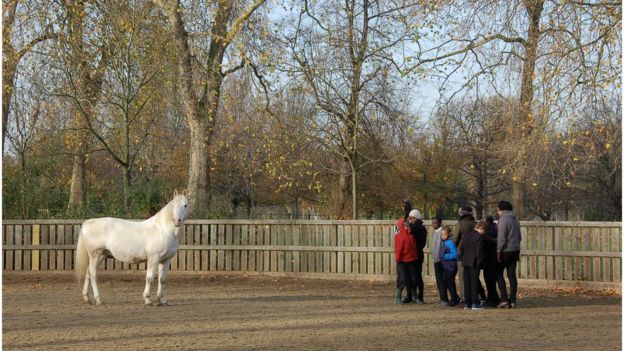 The project will run until March 2016
The project will run until March 2016
For Jhakada, 11, there are wider lessons. "At the same time, we were learning about ourselves - what we can do and our strengths and weaknesses," he says.
"It's about learning to work as a team. If we can work as a team here, we can work as a team in school."
The project has funding until March, and there are plans for more sessions next winter.
For Andreas, working with horses is perfect for teenagers who may have emotional issues but do not want to talk.
"We tell them, 'You can't assume they will trust you and you are accountable for your own safety,'" he says.
And it is this emphasis on personal responsibility for the actions of others in the group that is so powerful.
Andreas says: "There is no magic, no silver bullet. It's not a gimmick.
"It's using horses because they are radically different to us, to explore how we establish relationships, maintain relationships and manage conflict in relationships, while the horses give real-time feedback."


